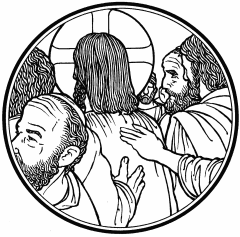Grace, mercy, and peace to you from God our Father, and from our Lord and Savior, Jesus Christ, amen. The text for the sermon is the Epistle, which was read earlier.
Memories are such a powerful thing. They can be good and pleasant, reminding us of times and feelings that are good, but they can also be bad, reminding us of times and feelings that bring heartache or disappointment. Memories can invoke such strong feelings, even help you remember who you are.
Calling upon the memories of the Ephesians, Paul is helping them to see what they have by looking back at what they were. It wasn’t a pleasant time for the Ephesians by any means, for they were a people without God, and Paul reminds them of their dark days. He says, “Remember that you were at that time separated from Christ, alienated from the commonwealth of Israel and strangers to the covenants of promise, having no hope and without God in the world.” This was a terrible problem for the Ephesians, an insurmountable obstacle. Now Paul reinforces how desperate their situation was by adding four more negative descriptions. They were excluded from citizenship in Israel, foreigners to the covenants of the promise, without hope, and without God in the world.
Recall that at Jacob’s well, Jesus told the Samaritan woman, “Salvation is from the Jews.” For Gentiles to be “alienated from the commonwealth of Israel” and “strangers to the covenants” that promised the Messiah was a dreadful plight. It made their situations hopeless. Paul can rightly say they were without hope because they were “without God in the world.” It is not that they were atheists, who denied the existence of a god. They had many gods, but they were false gods. They did not have the triune God, so they had no god at all to help them.
Paul doesn’t dredge up these old memories to hurt the Ephesians, but to help them; not to pull them down but to build them up. He wants them to make a comparison. Formerly they were without hope and without God in the world, but all that has changed.
Formerly they were “separated from Christ,” but now they are “in Christ Jesus.” Formerly they were “far off” from the covenant and God’s promised salvation, but now they “have been brought near.” Paul showed them their memories of days of old where they were and where they came from to where they are now and what has been done for them by Christ.
Each and every one of us is just like the Ephesians. We were people who were separated from God, but now are God’s beloved children. We were people who wanted nothing to do with God, but through the work and power of the Holy Spirit, we now flock to God as the One who gives us life and salvation.
That is the great mystery and joy in all of this. God our heavenly Father was not content to watch us die and be eternally separated from Him. And so He sends Jesus to make that atoning sacrifice on our part. And it is only Jesus who does this work and not us. Look at what Paul says: “But now in Christ Jesus you who once were far off have been brought near by the blood of Christ.” Not once but twice does Paul say that it is by Christ’s work that we have salvation. Man is not mentioned as the one who does the work. It doesn’t say on account of man’s actions or man’s doing that we earn our salvation. The reason why man is left out of the equation is because man must be left out of the equation. We’re sinful. All that we do is tainted with sin. That includes whatever we might do to earn our salvation.
It is all Jesus who does the work for you. How has Jesus done this to you? It is no mystery, for the text tells us. It is not your efforts or character or desires: it is all the Lord’s doing. He has died for you and He is risen for you. Now, He builds you into His Church by means of His Word: that is what our text means when it says that you are “built on the foundation of the apostles and prophets, Christ Jesus himself being the cornerstone;” for the Lord used the apostles and prophets to record His holy Word and to point you to Christ, on whom the Church is built. And because you are now forgiven, you are a living stone in that holy temple, being built together into a dwelling place for God by the Spirit.
Everything is done by Jesus. That is the emphasis that Paul makes to the Ephesians in the last half of our text. He tells them, “For through him we both have access in one Spirit to the Father.” Where do we receive our salvation? It is through Jesus. It doesn’t say that we receive it through ourselves. It doesn’t say that we receive it from someone else. It doesn’t say that we receive it through anything of this world. Our salvation is solely from Jesus.
Christ not only redeemed sinners from the guilt and punishment of their sins, be He also made sure the good news of His victory over sin and death was proclaimed. The good news He brought was twofold. First, Christ brought peace, “peace to you who were far off and peace to those who were near.” It bears repeating that the basis for peace is Christ’s redemptive work on the cross and nothing else. Not only does that reconcile the sinner to God, but it also forms the basis for reconciliation between sinners, forging a complete, true, and lasting peace.
A second gift that comes through Christ’s preaching of reconciliation is the realization that an equality exists among forgiven sinners. We all stand on the same plane as God’s forgiven and redeemed children. For the Ephesians, this was quite the revelation, as this did away with the distinction of Jew and Gentile, of those who were “more favored” by God. And so that holds true for us as well. There is not a single one of us that is more loved or more important to God than another, for we are all of the same value: sinners who have been made children of God by Jesus Christ and His life, death, and resurrection. Everyone is one for whom Christ has died. Some believe, but many do not. Some will be untrustworthy, even predatory and harmful – not because of skin color or ethnicity or social status, but because of sin. But everyone is one for whom Christ has died. This is what we practice as Christians.
Christ is our Cornerstone. He is the foundation of our Christian faith because it is He who earned forgiveness for each one of our sins. It is He who made atonement that no mortal man ever could. Through Him you have access to the Father, who no longer sees your sin but rather sees Jesus when He sees you. By virtue of your Baptism into Christ, where you were clothed in Christ’s righteousness, you are washed in the blood of the Lamb without blemish. In Him, you are now no longer a stranger, but a fellow citizen and member of the household of God. In Jesus’ name, amen. Now the peace of God that passes all understanding keep your hearts and minds through faith in Christ Jesus, amen.



